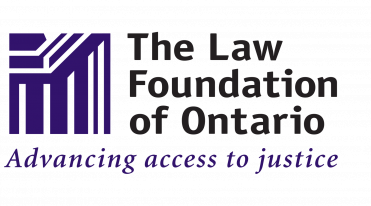
The Law Foundation of Ontario is making a significant reinvestment in our Catalyst program, made possible by the Foundation’s present strong economic position.
From June to December 2024, the Foundation approved new Catalyst grants totaling $45.5M for the program’s current cohort of 25 organizations. Commencing in January 2025, these new 3-year grants represent a significant increase over the previous cycle.
Throughout 2024, Catalyst grantees submitted applications outlining their 3-year strategic and implementation plans and met with Foundation staff to review them together. All grantees had the opportunity to request additional funds to help address longstanding needs and build their capacity to deliver their programs and services.
Separately, the Foundation plans to invite new applicants to join the Catalyst program in 2025. We encourage you to subscribe to our newsletter to receive news about this and all other calls for applications.
Launched in 2018, the Catalyst program provides leading organizations working to advance access to justice in Ontario with a unique opportunity to secure multi-year core funding. Catalyst supports organizations with a proven track record of high-quality legal services to improve their ability to adapt, innovate, and respond to emerging needs.
Catalyst grants
Aboriginal Legal Services Inc.
$562,000
Aboriginal Legal Services (ALS) supports Indigenous community members across Ontario who are experiencing legal issues. ALS offers legal services such as court workers, Gladue services, a post-charge diversion program, an alternative dispute resolution program for child welfare matters, and justice circles. This initiative enhances Indigenous communities’ access to legal services that are culturally responsive.
Access to Justice Program, The 519 Church Street Community Centre
$1,359,000
The 519’s Access to Justice Program responds to the legal needs of BIPOC 2SLGBTQIA+ communities in Toronto and Ontario. The 519 offers a general summary advice legal clinic, specialty legal clinics for criminal law, immigration and refugee law, housing law, and Trans ID matters. It also offers refugee mock hearings, a court support program, and public legal education workshops. Expanded efforts will support more access to justice services and programs for trans and non-binary populations and the production of a handbook with a focus on Ontario Law as a critical response to rising hate and violence against the 2SLGBTQIA+ community.
Advocacy Program, Métis Nation of Ontario
$1,144,000
The Métis Nation of Ontario’s Advocacy Program increases the understanding of individual rights, responsibilities, and the legal system, encompassing knowledge and awareness of laws, regulations, and legal processes, including Gladue report supports and services, that affect the lives of Métis people.
Association des juristes d’expression française de l’Ontario
$1,539,000
L’Association des juristes d’expression française de l’Ontario (AJEFO) offers public services, including free 30-minute consultations with a lawyer in French or English, to anyone with a legal problem in the province. AJEFO also operates cliquezjustice.ca, which houses simplified legal information to assist users to better manage everyday legal issues. AJEFO also hosts legal workshops and creates simplified legal resources for vulnerable groups. Additionally, it facilitates Law Days, which provide an opportunity for secondary students in French-language high schools to explore themes related to justice. This initiative will enhance Ontarians’ access to French language legal services.
Canadian Civil Liberties Education Trust
$1,467,000
The Canadian Civil Liberties Education Trust (CCLET) delivers workshops to educate Ontario students, teachers, newcomers, and the public about their civil rights and freedoms, and democracy more broadly. This initiative increases access to reliable and youth-centric information on civil liberties. CCLET will expand its efforts to deepen relationships and programming for Indigenous and northern Ontario communities and develop new resources for students and teachers interested in starting Gender Sexuality Alliances in their schools.
Canadian Forum on Civil Justice
$583,000
The Canadian Forum on Civil Justice (CFCJ) is a national nonprofit organization with a mandate to advance civil and family justice reform. Over the next three years, CFCJ will learn more about people’s justice pathways and the dispute resolution models showing promise in meeting people’s legal needs. To achieve this, it will explore justice solutions and their impact, gather socio-legal data, and research insights relevant to Ontario’s civil and family justice landscapes.
Childhood Arrivals Support and Advocacy Program, Justice for Children and Youth
$2,101,000
The Childhood Arrivals Support and Advocacy Program works to support undocumented childhood arrivals. These are young people who were moved to Canada as children who have lived all their lives without official authorization or documentation, and thus are vulnerable to deportation to birth countries where they have little to no connection. Activities include outreach to youth, teachers, and parents through schools and community programs and legal system navigation, including legal support, in an effort to file permanent residence applications.
Community Legal Education Ontario
$2,897,000
Community Legal Education Ontario (CLEO) develops clear, accurate, and practical legal education and information to help Ontarians understand and exercise their legal rights, especially those who face barriers to accessing the justice system. The CLEO Connect program offers training and resources for trusted intermediaries who assist people with low incomes to identify and address their legal issues. CLEO also conducts public legal education (PLE) research for the benefit of legal education stakeholders and will launch a Generative AI in PLE project to enhance the usability of CLEO’s Guided Pathways website, which assists users to complete legal forms. CLEO’s work enhances access to justice for Ontarians by making legal information more widely available in accessible formats, and by making legal documents easier to complete.
Connecting Ottawa, Community Legal Services of Ottawa
$1,539,000
Connecting Ottawa coordinates a consortium of over 50 legal and non-legal organizations to implement a regional plan to provide legal information and referrals to people who are not proficient in English or French or who face communication challenges as the result of a disability or sensory impairment. The initiative enhances linkages between legal and community workers in Ontario.
Criminalization of Women Pro-Bono Project, Barbra Schlifer Commemorative Clinic
$811,000
The Criminalization of Women Pro-Bono Project at the Barbra Schlifer Commemorative Clinic provides trauma-informed summary legal advice, brief services, high-need case management, and referrals to women and non-binary people who have experienced gender-based violence and have been charged with or convicted of a criminal offence. This initiative connects women and non-binary people to responsive and trauma-informed legal support.
FCJ Refugee Centre
$1,313,000
The FCJ Refugee Centre serves refugees and others at risk due to their immigration status through all steps of the refugee determination and refugee appeals processes. The Centre primarily works with refugee claimants, rejected refugee claimants, individuals with precarious immigration status, temporary foreign workers, and those who have been victims of human trafficking. It also provides training workshops and legal education materials for frontline workers who serve refugees in the Greater Toronto Area and other parts of southern Ontario on aspects of the immigration and refugee process and procedures. The Catalyst grant will help the Centre to ensure it has the capacity and expertise to serve its clients and assist other organizations to do so, as well as to ensure its evolution and sustainability.
Innocence Canada
$2,579,000
Innocence Canada is dedicated to identifying, advocating for, and supporting the exoneration of individuals wrongly convicted of a crime, and to preventing future wrongful convictions through legal education, and justice system reform.
Law Commission of Ontario
$2,739,000
The Law Commission of Ontario (LCO) is Ontario’s leading law reform agency, conducting research, providing multidisciplinary analysis, and reports on emerging legal policy issues. The LCO conducts research focused on artificial intelligence, consumer protections, environmental accountability, and protection orders. The LCO creates reports in multiple languages and builds new partnerships to expand the reach of its research. The LCO aims to promote access to justice and contribute to public debate to benefit the general public and justice sector stakeholders.
Law in Action Within Schools
$1,813,000
Law in Action Within Schools (LAWS) delivers an academic and extra-curricular program to teach young people about law and justice and to support them in graduating high school, accessing post-secondary education, gaining summer jobs related to legal public interest and social justice organizations, and considering a justice or legal career. It focuses on high school students experiencing barriers to postsecondary success.
Level
$928,000
Level will deliver and grow its three youth programs in Ontario: the Indigenous Youth Outreach Program , a justice education and mentorship program for First Nations, Métis, and Inuit youth; the Environmental Justice Program, a program to provide knowledge and skills for youth to advocate for environmental justice;, and the Black Youth Justice Program, providing justice education and mentorship to Black youth. These programs encourage youth to increase their critical thinking and leadership skills and their knowledge of the law and careers in justice.
Luke’s Place Support and Resource Centre for Women and Children
$1,207,000
Luke’s Place (LP) supports women in Durham region who have experienced intimate partner violence (IPV), as well as their families, and the professionals who support them to navigate the family law system. LP’s services include a legal clinic, family court support, legal information sessions, resources to help women understand their rights, and a family law resource room for women to safely access computers to complete family court documents or attend virtual court hearings. LP also leads trainings for service providers and lawyers who support survivors of IPV through family court.
Muslim Legal Support Centre
$1,198,000
The Muslim Legal Support Centre (MLSC) connects Muslim communities across the Greater Toronto Area (GTA) to volunteer lawyers who provide free summary advice, legal document preparation, and guidance on navigating legal processes. MLSC also hosts public legal education sessions and drop-in clinics in partnership with community organizations in the GTA. This initiative enhances Muslim communities’ access to culturally responsive and accessible legal support.
National Self-Represented Litigants Project
$766,000
The National Self-Represented Litigants Project is dedicated to better understanding the needs, motivations, and challenges of self-represented litigants (SRLs) in civil and family courts and administrative tribunals. It promotes new and more affordable models of legal service delivery that better support SRLs. It is committed to the development of practical resources geared specifically to SRL’s needs, especially in relation to cultural and procedural matters that can often confound them.
Ontario Justice Education Network
$3,954,000
The Ontario Justice Education Network engages the judiciary, the Bar, the courts, and the education community throughout Ontario by developing and growing innovative educational tools that introduce young people to the justice system. This initiative provides young people with tools to understand the law and develop the ability to address their own legal issues. OJEN will increase the range and depth of its public legal education initiatives, focusing on increased Francophone resources, more in-person programming, website redesign, and increased learning from Indigenous partners to inform approaches to programs and services.
Pro Bono and Public Education Program, Canadian Centre for Housing Rights
$1,261,000
The Canadian Centre for Housing Rights (CCHR)’ Pro Bono and Public Education Program provides legal support that is tailored to the needs of low-income tenants in Ontario who face eviction or experience human rights violations connected to their housing. CCHR offers educational programming for service providers, workshops for community members, system navigation support, and referrals to volunteer lawyers. CCHR will also research emerging and ongoing legal challenges in housing across Ontario, enhance staff training on diversity, equity and inclusion, and implement a development strategy and impact measurement framework. This initiative enhances tenants’ access to timely and reliable legal support.
Probono Inmate Appeal Program
$677,000
The Probono Inmate Appeal Program (PIAP) coordinates and supports a roster of experienced criminal appellate counsel to act as duty counsel on the appeals of unrepresented appellants in criminal cases before the Court of Appeal for Ontario. PIAP will also provide guidance on procedure and strategy for ineffective assistance of counsel appeals. This initiative will enhance unrepresented appellants’ access to legal support.
Pro Bono Ontario
$7,957,000
Pro Bono Ontario (PBO) develops and manages programs that connect volunteer lawyers with Ontarians who can’t afford a lawyer. Wherever possible, it embeds its free legal services in frontline environments like courthouses, schools, and hospitals – places frequented by people with legal problems they can’t afford to address. Its signature program is its Legal Advice Hotline where it provides up to 30 minutes of free legal advice and assistance with civil law matters in Ontario. PBO plans to transform its volunteer outreach and recruitment strategies and to improve its use of technology to streamline the client and volunteer experience.
Pro Bono Students Canada
$3,232,000
Pro Bono Students Canada (PBSC) provides legal help without charge to low-income individuals and nonprofit organizations and experiential learning opportunities to law students. With chapters in 22 of 23 Canadian law schools, PBSC develops legal placements for law students in a range of work settings including legal clinics, nonprofit organizations, courts, and tribunals. Under the supervision of a lawyer, student volunteers draft memos, develop and deliver legal education workshops, assist lawyers and duty counsel with client intake, assist clients with document preparation, represent clients before tribunals and courts, and provide legal information to clients.
Workers’ Action Centre
$869,000
The Workers Action Centre (WAC) is expanding their reach to benefit temporary, low-wage, and precarious workers across southern Ontario. WAC operates a workers’ rights phone line in 6 languages and lead workshops about workers’ rights to improve access to justice for multi-racial and immigrant workers who have little protection and power in the workplace, and who are unable to adequately deal with violations or access labour and human rights protections.
The Osgoode Society for Canadian Legal History
$1,015,000
The Osgoode Society for Canadian Legal History studies and promotes public interest in the history of the law, the legal profession, and the judiciary in Ontario and elsewhere in Canada. It does so by publishing books on Canadian legal history, creating and preserving an oral history archive, supporting academic research, and hosting a diverse range of topical educational events.


